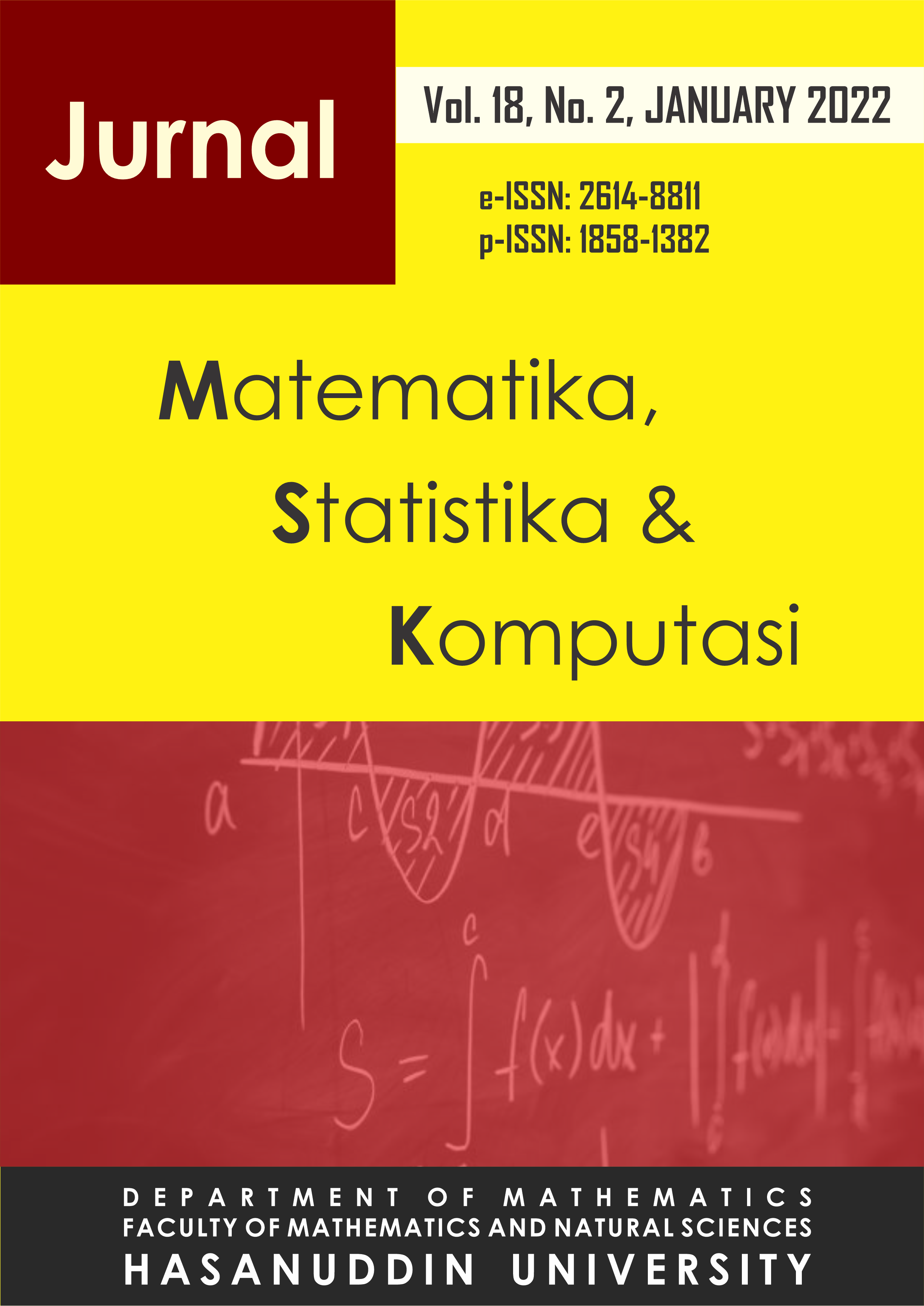The Application of GARCH Forecasting Method in Predicting The Number of Rail Passengers (Thousands of People) in Jabodetabek Region
DOI:
https://doi.org/10.20956/j.v18i2.18382Keywords:
Trains Passangers, ARIMA, ARCH-GARCH, ForecastingAbstract
PT. Kereta Api Indonesia and PT. KAI Commuter Jabodetabek records time series data in the form of the number of train passengers (thousand people) in Jabodetabek Region in 2011-2020. One of the time series methods that can be used to predict the number of train passengers (thousand people) in Jabodetabek area is ARIMA method. ARIMA or also known as Box-Jenkins time series analysis method is used for short-term forecasting and does not accommodate seasonal factors. If the assumption of residual homoscedasticity is violated, the ARCH / GARCH method can be used, which explicitly models changes in residual variety over time. This study aims to model and forecast the number of train passengers (thousand people) in Jabodetabek area in 2021. Based on data analysis and processing using ARIMA method, the best model is ARIMA (1,1,1) with an AIC value of 2,159.87 and with ARCH / GARCH method, the best model is GARCH (1,1) with an AIC value of 18.314. Forecasting results obtained based on the best model can be used as a reference for related parties in managing and providing public transportation facilities, especially trains.
References
. Ali, S., & Andabdulaziztariq, H., 2018. Forecasting Passenger Numbers in Saudi Arabian Airlines Flights. 7(4), 1–14.
. Abdelhafez, M. E. M., 2018. Using GARCH Models for Modelling and Forecasting Volatility an Empirical Study of the Egyptian Stock Market. 57(2), 167–178.
. Awat, J. Napa, 1990. Metode Peramalan Kuantitatif. Yogyakarta: Liberty.
. Badan Pusat Statistik, 2021. Jumlah Penumpang Kereta Api (Ribu Orang), 2011-2020. Badan Pusat Statistik. Diakses dari https://www.bps.go.id/linkTableDinamis/view/id/815 [Diakses 7 April 2021].
. Brooks, C., 2014. Introductory econometrics for finance, volume 3. Cambridge University press.
. Enders, W., 1995. Applied Econometric Time Series. New York: Jhon Wiley & Sons.
. Hanke, J. E dan Wichern, D. W., 2005. Business Forecasting, 8th Edition. New Jersey: Prentice Hall.
. Hendranata, Anton, 2003. ARIMA (Autoregressive Moving Average). Manajemen Keuangan Sektor Publik FEUI. Diakses dari http://daps.bps.go.id/file_artikel/77/arima.pdf [Diakses 7 April 2021].
. Makridakis, dkk., 1993. Metode dan Aplikasi Peramalan Jilid 1, Edisi Pertama. (Terjemahan Untung S., Andrianto). Jakarta: Erlangga.
. Makridakis, dkk., 1995. Metode dan Aplikasi Peramalan. Jakarta: Erlangga.
. Makridakis, S. dan Wheelwright, S.C., 1999. Metode dan Aplikasi Peramalan, Edisi Kedua. Jakarta: Binarupa Aksara.
. Putri, A.R., 2019. Pemodelan dan Peramalan Curah Hujan di Kabupaten Bogor menggunakan Metode Seasonal Autoregressive Integrated Moving Average (SARIMA). Universitas Padjadjaran.
. Sudjana, 1986. Metode Statistika. Bandung: Tarsito.
. Syukrina, F., 2020. Penerapan Metode Peramalan Model GARCH dalam Memprediksi Indeks DST. Universitas Padjadjaran.
. Wei, W., 2006. Time Series Analysis: Univariate and Multivariate Methods, 2nd Edition. Boston: Addison-Wesley Publishing Company.
Downloads
Published
How to Cite
Issue
Section
License
Copyright (c) 2021 Author and publisher

This work is licensed under a Creative Commons Attribution 4.0 International License.

This work is licensed under a Creative Commons Attribution 4.0 International License.
Jurnal Matematika, Statistika dan Komputasi is an Open Access journal, all articles are distributed under the terms of the Creative Commons Attribution License, allowing third parties to copy and redistribute the material in any medium or format, transform, and build upon the material, provided the original work is properly cited and states its license. This license allows authors and readers to use all articles, data sets, graphics and appendices in data mining applications, search engines, web sites, blogs and other platforms by providing appropriate reference.







